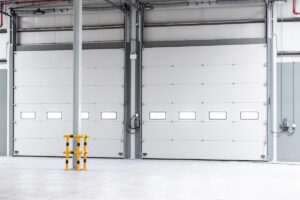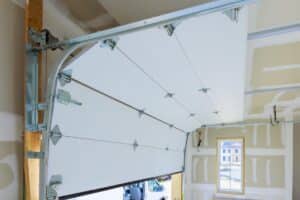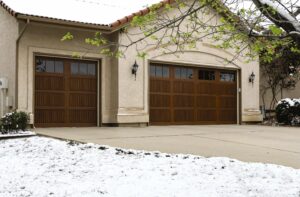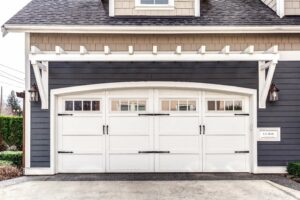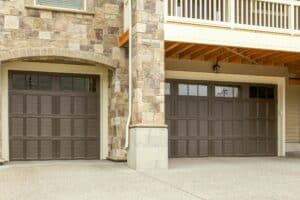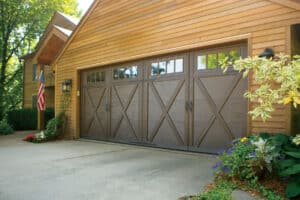Garage doors are an essential part of our homes, providing security and convenience. However, like any mechanical system, they can develop problems over time. These issues can be frustrating and disruptive to your daily routine. But fear not! In this article, we will address common garage door problems and provide step-by-step solutions to help you regain control of your garage.

Noisy Garage Door
One of the most common complaints homeowners have about their garage doors is the noise they make. A loud, creaky door can be bothersome, especially if you have a bedroom or living space near the garage.
Causes of Noisy Garage Doors
There are several reasons why your garage door might be making noise. Understanding the root causes is the first step in addressing the issue.
#1 Lack of Lubrication
Regularly lubricating the components of your garage door is a fundamental aspect of its maintenance. Over time, these components, including hinges, rollers, and springs, can become dry due to exposure to dust and changing weather conditions. As they lose their lubrication, friction between the moving parts increases.

This increased friction not only leads to annoying noise when your garage door operates but also places additional stress on the components, potentially shortening their lifespan.
When you apply proper lubrication, you not only reduce noise levels but also promote the longevity and efficient functioning of your garage door. It’s a simple yet crucial task in ensuring your garage door operates smoothly and quietly.
#2 Worn Rollers
When the rollers on your garage door have worn out or sustained damage, they can become a significant source of noise. As your garage door moves along its tracks, these compromised rollers can create a distinct grinding noise. This noise is not only irritating but also indicative of a potential problem with your door’s functionality. Worn-out rollers can not only disrupt your peace and quiet but also lead to further complications if left unaddressed.

It’s crucial to promptly identify and replace damaged rollers to restore the smooth and quiet operation of your garage door while preventing any potential long-term issues.
Fixing a Noisy Garage Door
Now that we know why your garage door is making noise let’s discuss how to fix it.
Fix 1: Lubricate Moving Parts
Regularly lubricating the rollers, hinges, and springs can significantly reduce noise. Be sure to use a silicone-based lubricant for best results.
Consistent lubrication of the rollers, hinges, and springs not only reduces noise but also plays a vital role in extending the lifespan of your garage door components. Applying a silicone-based lubricant not only ensures quiet and smooth operation but also minimize wear and tear caused by friction. This proactive maintenance not only keeps your garage door operating optimally but also saves you money in the long term by reducing the need for costly repairs or part replacements.
It’s a simple yet effective way to preserve the longevity and functionality of your garage door system while maintaining a peaceful and hassle-free home environment.
Fix 2: Replace Worn Rollers
If your rollers are damaged, it’s best to replace them. This is a straightforward DIY task that can make a significant difference.
Replacing worn rollers is not only about improving the operation of your garage door but also enhancing its safety. Damaged rollers can lead to uneven door movement and increase the risk of accidents or injuries. By taking the initiative to replace them, you create a safer environment for you and your family, reducing the chances of unexpected door malfunctions or unexpected closures.
Garage Door Won’t Open or Close
Another common problem is when your garage door refuses to cooperate. It can be incredibly frustrating when you’re stuck inside or outside your garage.
Causes of Garage Door Refusal
Understanding why your garage door won’t open or close is crucial to finding a solution.
#1 Sensor Obstruction
Garage doors come equipped with sensors designed to enhance safety and prevent accidents. These sensors play a crucial role in ensuring that your garage door operates without causing harm or damage. In the event that these sensors detect an obstruction in the path of the closing door, they are programmed to immediately halt the closing process.

This safety feature is invaluable, as it prevents accidents and protects people, pets, and objects from being trapped or injured by the garage door. Understanding how these sensors work and ensuring their proper functioning is essential for maintaining a secure and accident-free garage environment.

#2 Misaligned Tracks
If the tracks that guide your garage door are misaligned, it can prevent the door from functioning correctly.
Fixing a Garage Door That Won’t Open or Close
Let’s explore the steps to resolve this issue.
Fix 1: Check for Sensor Obstructions
To ensure the smooth operation of your garage door and the effectiveness of its safety sensors, it’s crucial to regularly inspect the area surrounding these sensors. Start by visually examining the sensor’s vicinity, checking for any debris, objects, or obstructions that may be blocking their clear line of sight. Debris such as leaves, dirt, spiderwebs, or even stored items can interfere with the sensors’ ability to function correctly.
If you find any obstructions, promptly remove them to maintain the sensors’ optimal performance and ensure the continued safety of your garage door system. Regular sensor maintenance is a simple yet vital step in preventing potential accidents and ensuring the reliable operation of your garage door.
Fix 2: Align the Tracks
Use a level to check the alignment of the tracks. If they are misaligned, adjust them carefully until they are straight.
Properly aligned tracks are not only essential for the smooth operation of your garage door but also for its safety. Misaligned tracks can cause the door to derail or become unstable during operation, posing a risk of accidents or damage to the door itself.

Regularly inspecting and correcting any misalignments ensures that your garage door functions reliably, reducing the likelihood of unexpected breakdowns or safety hazards. It’s a simple yet effective maintenance task that contributes to the overall performance and safety of your garage door system.
Conclusion
Dealing with common garage door problems doesn’t have to be a daunting task. By understanding the issues and following these step-by-step solutions, you can save time and money on garage door repairs. Don’t let these problems stress you out; take control and make your garage door work smoothly again.

FAQs
Noisy garage doors can be caused by lack of lubrication or worn rollers. Regular maintenance can help reduce the noise.
Lubricate the moving parts like rollers, hinges, and springs with a silicone-based lubricant, and replace any worn or damaged rollers.
A silicone-based lubricant is recommended for the best results.
It’s best to lubricate the moving parts of your garage door every six months.
Rollers can wear out over time due to regular use and exposure to dust and weather conditions.
Replacing worn rollers is a straightforward DIY task; simply remove the old rollers and install new ones.
This issue could be due to sensor obstructions or misaligned tracks.
Check for and remove any obstructions around the sensors, and ensure the tracks are properly aligned.


